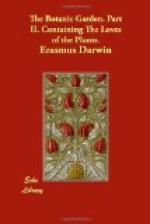3 Soft-warbling beaks | in each bright blos | som move, 4 And vo | cal rosebuds thrill | the enchanted grove, |
In these lines there is a quaver and a crochet alternately in every bar, except in the last, in which the in make two semiquavers; the e is supposed by Grammarians to be cut off, which any one’s ear will readily determine not to be true.
3 Life buds or breathes | from Indus to | the poles, 4 And the | vast surface kind | les, as it rolls. |
In these lines there is a quaver and a crotchet alternately in the first bar; a quaver, two crotchets, and a quaver, make the second bar. In the third bar there is a quaver, a crotchet, and a rest after the crotchet, that is, after the word poles, and two quavers begin the next line. The fourth bar consists of quavers and crotchets alternately. In the last bar there is a quaver, and a rest after it, viz. after the word kindles; and then two quavers and a crotchet. You will clearly perceive the truth of this, if you prick the musical characters above mentioned under the verses.
The common time of musicians is divided into bars, each of which contains four crotchets, or a proportional number of their subdivision into quavers and semiquavers. This kind of musical time is analogous to the dactyle verses of our language, the most popular instances of which are in Mr. Anstie’s Bath-Guide. In this kind of verse the bar does not begin till after the first or second syllable; and where the verse is quite complete, and written by a good ear, these first syllables added to the last complete the bar, exactly in this also corresponding with many pieces of music;
2
Yet | if one may guess by the | size of his calf,
Sir,
4
He | weighs about twenty-three | stone and a half,
Sir.
2
Master | Mamozet’s head was not | finished so
soon,
4
For it | took up the barber a | whole afternoon.
In these lines each bar consists of a crotchet, two quavers, another crotchet, and two more quavers: which are equal to four crotchets, and, like many bars of common time in music, may be subdivided into two in beating time without disturbing the measure.
The following verses from Shenftone belong likewise to common time:
2/4 A | river or a sea | Was to him a dish | of tea, And a king | dom bread and butter.
The first and second bars consist each of a crotchet, a quaver, a crotchet, a quaver, a crotchet. The third bar consists of a quaver, two crotchets, a quaver, a crotchet. The last bar is not complete without adding the letter A, which begins the first line, and then it consists of a quaver, a crotchet, a quaver, a crotchet, two quavers.




